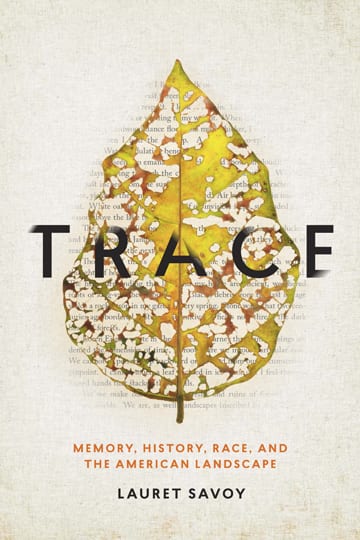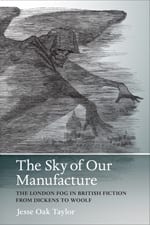Updated August 2017
ASLE is very excited to announce the winners of the 2017 ASLE Book and Paper Awards. The awards, in the areas of ecocriticism and environmental creative writing, recognize excellence in the field. The official presentation of certificates and $500 cash prizes for books, and $100 for graduate student papers, was made during the Authors’ Reception at the 2017 ASLE Biennial Conference at Wayne State University in Detroit, on Wednesday, June 21, 2017.
Creative Book Award Winner:
 Trace: Memory, History, Race, and the American Landscape (Counterpoint Press, 2015), by Lauret Savoy
Trace: Memory, History, Race, and the American Landscape (Counterpoint Press, 2015), by Lauret Savoy
Judges said of her book:
“Lauret Savoy’s Trace is an impeccably researched and gracefully written meditation on landscape, memory, and race. An important book that speaks directly and memorably to current political and theoretical concerns, Trace maps the links between personal and cultural memory, showing how place reveals itself through the erasures of human and geologic history.”
Trace won the 2016 American Book Award from the Before Columbus Foundation. It was also a finalist for the 2016 PEN American Open Book Award, the Phillis Wheatley Book Award, and the William Saroyan International Prize for Writing. Listen to the public radio interview with Lauret on “To the Best of Our Knowledge.”
Lauret Savoy is a professor of environmental studies and geology at Mount Holyoke College, where she explores the intertwining of natural and cultural histories. Her other books include The Colors of Nature: Culture, Identity, and the Natural World, Bedrock: Writers on the Wonders of Geology, and Living with the Changing California Coast. She lives in Leverett, Massachusetts.
Judges: Emily McGiffin, York University, the winner of the ASLE Creative Writing Award in 2015; Rich King, a finalist for the 2015 Creative Writing Award, a research associate with The Maritime Studies Program of Williams College and Mystic Seaport; and Tom Hallock, who teaches in the Visual & Verbal Arts Department at the University of South Florida-St. Petersburg.
Ecocriticism Book Award Winner:
 The Sky of Our Manufacture: The London Fog in British Fiction from Dickens to Woolf (University of Virginia Press, 2016), by Jesse Oak Taylor
The Sky of Our Manufacture: The London Fog in British Fiction from Dickens to Woolf (University of Virginia Press, 2016), by Jesse Oak Taylor
Judges commented:
“A richly layered analysis of the atmosphere of toxicity beginning in nineteenth century England and shadowing our own contemporary world, this book fills a significant gap in terms of ecocritical work on both the Victorian and modern eras. Indeed, The Sky of Our Manufacture makes a persuasive case for literature of that period as Anthropocene literature – and, in so doing, offers one of the strongest accounts of Anthropocene literature currently available. Taylor’s grasp of environmental history, material and economic theory, and illuminating textual readings is a model of ecocriticism. The book is also elegantly written, admirably focused, and highly original.”
Jesse Oak Taylor is Assistant Professor of English at the University of Washington. He is the co-editor of Anthropocene Reading: Literary History in Geologic Times (forthcoming 2017), co-author of Empowerment on an Unstable Planet: From Seeds of Human Energy to a Scale of Global Change (2011), and has written numerous articles on ecocriticism and empire.
Judges: Nicole Seymour, winner of the the winner of the ASLE Ecocritical Book Award in 2015, Tom Lynch, founding coordinator of the ASLE Book Awards and editor of the journal Western American Literature, and Molly Westling, Professor Emerita at the University of Oregon and author of The Green Breast of the New World: Landscape, Gender and American Fiction.
Graduate Student Paper Award Winners:
ASLE also awarded Graduate Student Paper Awards to two presenters at the 2017 Conference. Winners were awarded prizes of $100, and will have their work published in our journal ISLE: Interdisciplinary Studies in Literature and Environment. The submissions this year were numerous, varied in topic and approach, and remarkably impressive. The two co-winners were selected from an outstanding pool of entries. The judges agree that the two papers are highly deserving winners:
K.M. Ferebee, The Ohio State University, “The Quick and the Dead: Animacy, (Un)Burial, and Resistance in Pu-239 (The Half-Life of Timofey Berezin)”
Judges commented: This paper offers a compelling account of nuclear and environmental discourses of human death, and of new forms of agency engendered by anticipations of death both individual and collective. It engages theories of materialism, the boundary between life and non-life, and the Anthropocene’s challenge to traditional conceptions of causality. K. M. Ferebee extends recent inquiries into materialism and the Anthropocene. The paper stands out for its sharp prose and its synthesis of divergent theoretical arguments. Its analysis of the film Pu-239 suggests ways “[t]o comprehend and resist the Anthropocene’s slow violence and contamination.”
Marta Werbanowska, Howard University, “’There Is Hope in Connecting’: Black Ecotheology and the Poetry of Lucille Clifton”
Judges commented: Marta Werbanowska’s interpretation of the poetry of Lucille Clifton is committed to environmental justice. The paper highlights the importance of religious philosophies by combining Black liberation theology and ecotheology. Through close readings of Clifton’s poems, Werbanowska shows how the African American poet associates violence toward both humans and nonhuman nature with the oppressive character of white, patriarchal society. Werbanowska concludes that “[a]s an act of creation, the practice of poetry stands at the crossroads of spiritual development and pragmatic action—the two pillars of Black ecotheology whose values and ethics Clifton embodies in her works.”
2017 Judges: Sylvan Goldberg (Colorado College), Jennifer Ladino (University of Idaho), and Astrida Neimanis (University of Sydney)
Special thanks go out to ASLE’s Awards Coordinators for all their work this year:
Christoph Irmscher, Indiana University, Bloomington (Creative Book Award)
Salma Monani, Gettysburg College (Ecocriticism Book Award)
Nicholas Bradley, University of Victoria (Graduate Paper Award)
